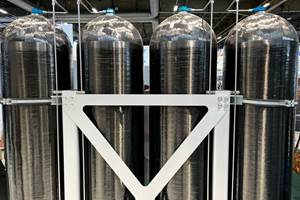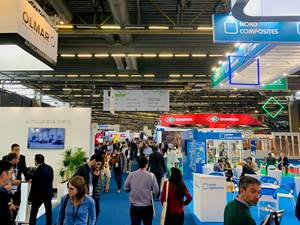JEC Innovation Award 2025 winners explore new composite frontiers
The following companies, organizations and project consortia featured strong collective innovation concepts, to be on display at JEC World 2025 in March.
Every year, through the JEC Composites Innovation Awards, the JEC Group (Paris, France) rewards collective cutting-edge, creative projects which demonstrate the full potential of composite materials. Since its creation in 1998, the innovation program has involved more than 2,100 companies worldwide, rewarding 258 companies and 670 partners. This year, the tradition continues. The following 11 Innovation Award winners have been announced, selected by an international composites jury.
Multifunctional Fuselage Demonstrator (MFFD)
A Clean Sky 2 funded consortium of 12 European organizations led by Airbus Operations GmbH investigated thermoplastic composites for commercial fuselage applications. The resulting full-scale demonstrator of a typical single aisle commercial aircraft fuselage section covers novel design and built concepts, elementary parts manufacture for automation as well as thermoplastic welding for sub- and major component assembly.
Companies: Airbus Operations GmbH, with partners Airbus Aerostructures GmbH (Germany); Aernnova Aerospace and affiliates (Spain); Diehl Aviation Laupheim GmbH (Germany); DLR – German Aerospace Center (Germany); Fidamc (Spain); Fraunhofer-Gesellschaft zur Förderung der angewandten Forschung e. V. (Germany); GKN Fokker Aerospace B.V. (Netherlands); NLR – Royal Netherlands Aerospace Centre (Netherlands); SAM XL (Netherlands); TU Delft (Netherlands); Saab AB (Sweden)
FibreLine
FibreLine is a system for the high-rate manufacturing of composite structures. It provides end-to-end automation for preforming, reportedly significantly accelerating the production rate of carbon fiber and other composite components in the aerospace, defense and renewable energy industries.
Companies: Loop Technology (U.K.) with partners FANUC (U.K.); Zünd (U.K.); and the National Composites Centre (U.K.)
Sustainability optimized composite automotive (SOCA)
The SOCA project purpose is to decarbonize the manufacturing of composite component for automotive applications, focusing first on low-volume carbon fiber parts. The main challenges were to reduce the CO2e footprint while maintaining the performance and light-weightiness.
Companies: JLR (U.K.) and partners Far-UK Ltd. (U.K.); CCP Gransden Ltd. (U.K.) and iCOMAT Ltd. (U.K.)
Thermoplastic sandwich molding technology
Thermoplastic sandwich molding technology enables the fully automated production of 3D-molded components in a material-efficient, lightweight sandwich construction. The potential of this hybrid technology was demonstrated using a storage compartment cover from a truck driver’s cab.
Companies: Fraunhofer IMWS (Germay) and partners Daimler Truck AG (Germany); ElringKlinger AG (Germany); ThermHex Waben GmbH (Germany); edevis GmbH (Germany); and Engel Austria GmbH (Austria)
Daccuss house wall

Source | TechnoCarbon Technologies GbR
Carbon fiber stone (CFS) is a material combining carbon-negative stones and bio-based fibers. It serves as an eco-friendly replacement for CO2-intensive concrete in house walls. Each square meter of CFS wall captures 59 kilograms of CO2, whereas traditional cement walls release 98 kilograms of CO2.
Companies: TechnoCarbon Technologies GbR (Germany) and partners DITF (Germany); LSL GmbH (Germany); Deutsches Zentrum für Luft- und Raumfahrt (Germany); AHP GmbH & Co. KG (Germany); Technical University Munich (Germany); University of Hamburg (Germany); Peer Technologies GmbH & Co. KG (Germany); Grein srl (Italy); Convoris Group GmbH (Germany); RecyCoal GmbH (Germany); ITA, Institut für Textiltechnik der RWTH Aachen University (Germany); and Lisd GmbH (Germany)
Induction heating-based rCF reclaiming
Carbon fiber is sensitive to electromagnetic fields with a specific frequency range. This induction heating (IH)-based pyrolysis technology employs high-frequency magnetic fields, generating rapid, localized heating in carbon fibers to enable efficient polymer matrix incineration. This method more energy-efficient than traditional sources, supports continuous production and preserves the mechanical performance of rCF.
Companies: Ilsung Composites Corp. (South Korea) and partners Korea Textile Machinery Convergence Research Institute (South Korea); Institute of Textile Machinery and High Performance Material Technology (ITM), Technische Universität Dresden (Germany); Wagenfelder Spinnereien GmbH (Germany); Cramer&Co. GmbH (Germany); and Hyundai Motors Corp. (South Korea)
Stylish and recyclable carbon fiber furniture
Cobra and its partners have coordinated the design, engineering, material selection and manufacturing of a range of innovative carbon fiber-based furniture products. The furniture uses recyclable epoxy resins, along with other production waste, and recycled raw materials.
Companies: Cobra International (Thailand) and partners Aditya Birla Chemicals Ltd. – Advanced Materials (Thailand); Burapha University (Thailand); Hankuk Carbon Co. Ltd. (South Korea); and Luxara Design Co. Ltd. (Thailand)
DigiTwin: 3D imaging, analysis and digital twinning
Partners have innovated a digital twin of as-manufactured composite components based on advanced computed tomography (CT) imaging and machine learning, which effectively maps fibers and defects from 3D images to create a detailed finite element mesh for high-fidelity performance simulation of composite components.
Companies: New Frontier Technologies (Australia), with partners CTLab – Australian National University (Australia); and Digital Composites Factory (Germany)
FIBRE4YARDS
FIBRE4YARDS has developed new composites production technologies to redefine shipbuilding by adopting a modular construction and automated processes such as additive manufacturing, reusable molds that can adopt double curvature shapes, curved pultruded profiles, stamped thermoplastics and new connection technologies to facilitate the assembly of all parts. In addition the project has developed new design tools and a production software based on IoT.
Companies: International Center for Numerical Methods in Engineering – CIMNE (Spain) and companies Curve Works (Netherlands), Robtrusion (Spain), 10XL (Netherlands); Compass Ingeniería y Sistemas SA – CompassIS (Spain); Institut de Recherche Technologique Jules Verne (France); Inegi (Portugal); Técnicas y Servicios de Ingeniería SL (Spain); Bureau Veritas (France); Lodz University of Technology (Poland); L-UP Sas (France) and Zafiro Business Solutions Kft (Hungary)
ZEBRA – Zero wastE Blade ReseArch project
The ZEBRA project’s aim is to demonstrate the technical, economic and environmental relevance of thermoplastic wind turbine blades on a full-scale demonstrator, with an eco-design approach to enable a high recycling rate.
Two full-scale thermoplastic wind turbine blades (62.2 and 77.4 meters) have been manufactured by LM Wind Power with Arkema’s Elium resin and Owens Corning’s Ultrablade fabrics and tested using accredited methods. Recycling solutions have been developed, to generate recycled Elium monomer and to recover glass fiber at pilot scale.
Companies: IRT Jules Verne (France) and partners Arkema (France); Canoe (France); Engie (France); LM Wind Power (Denmark); Owens Corning (France); and Suez (France)
Honey roots technology
Honey-roots-technology (HRT) is a fiber-reinforced 3D structure that is superficially anchored in the core. The HRT laminate shows optimal mechanics while enabling an infusion process with significantly reduced waste. This technology was used to construct a recyclable surfboard. With a layup consisting of lyocell and cellulose, a core out of lignin and recycled content, the majority of the material composition has a wood origin. The resin system used is bio-based and recyclable.
Companies: The Gun Sails von Osterhausen GmbH (France) and companies RWTH Aachen University (Germany); Aditya Birla Chemicals – Advanced Materials (Germany); Chemnitz University of Technology (Germany); Norafin Industries GmbH (Germany); Evonik Operations GmbH (Germany); and Jackson Insulation GmbH (Germany)
Related Content
Recycling hydrogen tanks to produce automotive structural components
Voith Composites and partners develop recycling solutions for hydrogen storage tanks and manufacturing methods to produce automotive parts from the recycled materials.
Read MoreJEC World 2023 preview
JEC World is the composites industry’s largest trade event, featuring exhibits, presentations and specialized pavilions covering the entire composites industry supply chain.
Read MoreJEC World 2025 unveils Innovation Award finalists
These 33 finalists, celebrating successful projects and partnerships in composites innovation, will be narrowed down to 11 winners at the JEC World 2025 Premiere on Jan. 13, 2025.
Read MoreJEC announces 11 Innovation Award winners
The JEC Group has announced the winner for each of the 11 Innovation Award categories. Learn more about the winners and their projects at JEC World 2024.
Read MoreRead Next
SAMPE, JEC bring SAMPE Technical Sessions, Young Engineers Challenge to JEC 2025
SAMPE Global will introduce technical programming directly to the JEC World show floor this year, showcasing expertise from its regions and providing international perspectives.
Read MoreSPE automotive names winners for 53rd annual automotive innovation awards program
SPE’s annual Automotive Innovation Awards highlighted several composite part designs in vehicle safety, comfort and efficiency.
Read MoreNoble Gas receives Approval in Principle for gas storage system
Independent assessment by DNV confirms the general feasibility of the company’s composite comformable hydrogen storage vessels, applicable for transportation, defense, marine and aviation environments.
Read More

























.jpg;maxWidth=300;quality=90)











